May Day At Mizzou
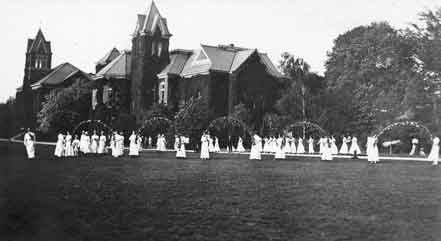
May Day "Dance of the Seasons on Francis Quadrangle, 1912.
(University Archives, C:0/46/7)
Early Traditions
May Day originated as a spring fertility festival in India and Egypt to celebrate the goddess of spring. The holiday is also tied to agricultural rituals in Medieval Europe. It was tradition for villagers to go before dawn, on the eve of May First, in search of a tree that could become the village Maypole. The tree would be cut down and the boughs sawed off. Oxen dragged the tree into the village, initiating celebration and enthusiasm from the villagers, who paraded in the streets.
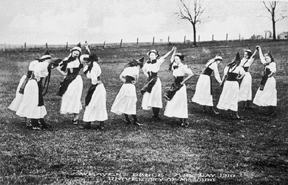
Students perform the Weaver's Dance, a May Day tradition, on campus in 1910
(University Archives, C:0/46/7)
The original purpose of the Maypole and rituals surrounding it was to celebrate the fertility of the new season's crops. However, May Day celebrations in England came under fire by the Puritans in the 17th century. They claimed the holiday was a time of reckless sexual conduct, "a hundred youths go into the woods over night...scarcely a third of them returned home undefiled." Over time, the meaning of May Day evolved and the emphasis on agriculture diminished. The celebration of May Day at Mizzou reflected modern adaptations and was promoted as a holiday by, for, and about women.
The Maypole
In earlier celebrations, men and women danced around the Maypole singing the May Song and holding the Maypole ribbons. Single men and women hoped to get their ribbons entangled with their love interest. In later celebrations, the revelries were performed exclusively by women. In keeping with time-honored practices, the Maypole at Mizzou was decorated with flowers and ribbons.
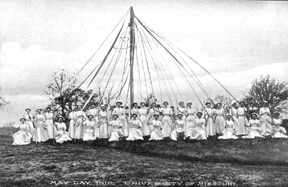
Maypole on campus, 1910
(University Archives, C:0/46/7)
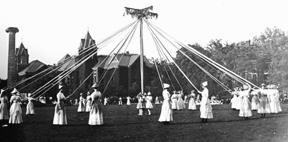
Students holding the Maypole ribbons, 1911
(University Archives, C:0/46/7)
May Day at Mizzou
May Day was celebrated at Mizzou from approximately 1910 until the 1920s. It was an important festival on campus, and it was virtually the only holiday that specifically celebrated women. Women were first admitted to the University of Missouri in 1867, but it wasn't until the following year that the first 22 women enrolled. By 1915, there were 700 women enrolled in the University, and 200 of them were in the School of Education.
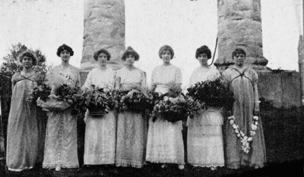
1914 May Day celebrants take time out to pose before the columns
(University Archives, C:0/3/7 and Savitar)
Please click here to view Page Two of May Day at Mizzou
